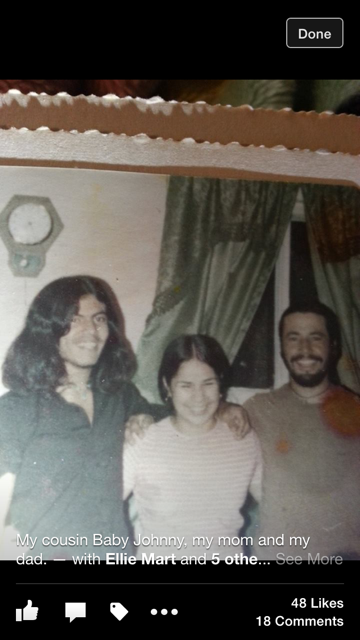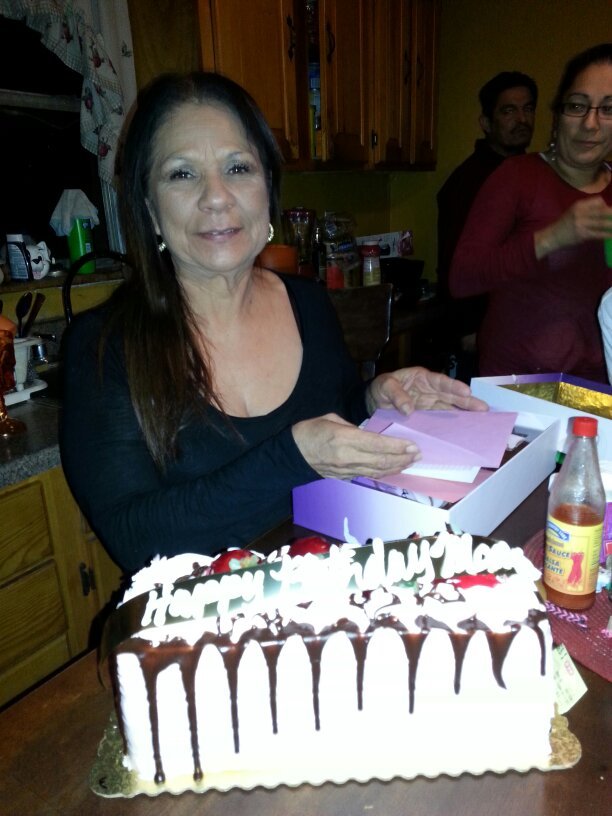TRANSCRIPTION
What was your childhood like growing up?
I grew up with 8 sisters and 6 brothers and we all, it was a house with 3 bedrooms, we had to share ah rooms, I had to share a room with my 2 smaller sisters, with Virgie and Rosie when they were babies and we used to go to my tios house with my abuelita and we used to build a fire out there, we used to go to the monte out there, like a forest out there, pick up sticks, make fires, she used to make the beans outside, make tortillas out there and we used to eat beans and we used to eat tacos with beans and all that. And then my grandma had a kerosene ah stove, so me and my cousin Gelda we would go down to the little corner store it was like a little ice house there and we used to get kerosene for like a dime and fill up the kerosene so we can cook on the stove.
How was it like growing up with so many siblings?
Fighting, we got to share everything. We had to wake up like, my mom, like it's not like now where yall have free lunch we didn't, we never had free lunch. We used to take tacos, I used to trade my tacos with the, oh I can't say it the African Americans. (She thought she could not say certain words but I told her talk and say how you normally would.)Oh well the black people, well yea at that time we didn't know them as African Americans we knew them as black people or negros at that time really! We grew going to school with black people with Mexicans, Hispanics and white people. We didn't grow up with our dad, he was always in the service, we just grew up with my mom. So we weren't really close with our dad, we didn't call him dad we called him "Chello" and "emme" we called her mom we called her emme she was our emme.

What was a typical day like as a little girl?
We had to get up at five o clock in the morning every morning, get ready, we had to make up our beds, we had to clean, we had to sweep, ya by the time we finished that my mom already had the tortillas made and she had our breakfast made. At 7:30 we had to be out there by the bus stop and wait for the bus to pick us up. Or we used to walk to P.F Stewart, at that time we didn't have money to go buy lunch either we came home for lunch. Sometimes at the first of the month my mom when my mom would get her check would give us dome money like a quarter, we could but shit a lot of stuff with a quarter. To get shoes there's was a store called solar surf and for us to not take all of us to the store she would get a rope her and Alycia and measure our feet with a rope, really I'm not lying. My mom would go down town and get our shoes and all that. We had this little named chato, he was a little little dog we called him chato. Come home after school and dinner would be ready. Sometimes on the weekend we would go to my tio nonos house and Josie's and we get together there with all our cousins with Richard and them and be playing there, going up the hill go to the little forest and all that while they cooked and all that with my grandma. And we used to roll cigarettes with my grandma cause she taught us how to roll me and Gogie, we used to sit in the back we used to go, it was called bobby lees and she used to buy the pouch of the buglers, we used to go buy buglers a nickel and we used to sit there with my grandma on the porch and roll cigarettes with her, me and my sister, Gogie and then after we were done she would out them in her pouch sit back on her rocker talking about when she was young too smoking cigarettes.
Where did you live? Street name? How was your neighborhood like?
On the east side at that time we lived there is was called Artesia Street now known as Pecan Vally Drive. And we didn't speak no English we spoke nothing but Spanish, we didn't know English. We learned from our neighbor's when they had moved there. When my dad built the house there. When the Sigin's moved in there that's when we learned from them. My mother never learned. It was a small neighborhood real small, we couldn't go spend the night like at people house we had to stay there. Ya by whatever time eight o clock to seven we had to be in showered and everything, bed time! We used to go to the movies in my tio nono's truck, he had a yellow truck with benches and we would go, a dollar a car load. It was practically us and our cousins.
What were your dreams as a little girl?
Ohh to go out! (Started laughing) and get a good job
What types of chores did you have around the house growing up? Did you have a job?
Oh we had to clean our room we had to wash our dishes, we had to do our own washing we had to get tubs and fill it up with water, there was no machine at that time we had to scrub it. We had to hang our clothes, fold everything. Before I went to bed everything had to be clean, yup, take a shower and go to bed. And we didn't have air condition ad we had no fan either. We used to sleep outside on the porch sometimes just with the pillows on the porch just like that. The Little Red Barn cleaning tables, I used to get fifty cents an hour, that's what they paid us.
Did you have any role models as a young girl? Who? And why?
My brother Raymond, because he was the one that taught me to defend myself and nit take shit from nobody, well how to take care of myself.
Coming from a big family did it make you want to have your own big family?
Yes! I wanted a big family and I did 7 kids.
What are some changes you witnessed for women?
A lot of women now have man held jobs and the women didn't get paid the same amount as the men would.
Did you ever further your education? If so where?
I did I went to school, I went to school when clemente was, oh how old was clemente, when we was like a year old I think, I went back to school I went to St. Philips, I was going for a social worker like in the medical field. I got like 45 or 65 hours I think I went to SAC like one time cause they didn't have it at St. Philips, I got my GED.
Did you like being a stay home wife/mom?
Yup, I took care of the kids, cleaned, and cooked
Is there anything else you would like to add to this interview?
My brother Raymond drowned, I had a brother he was 16, he played football for Sam Houston High School and he went to a creek, they went swimming and he drowned. It was hard for emme, and Chello wasn't there at the time they had to bring him home. We were never close to our dad. He was real young when he passed away and hard on the family especially emme, it was real hard. And I used to fight with my brother a lot, I would fight with Ruben a lot, he can tell you. But we got along and everything just little things irritated us, with 1 bathroom and 14 of us in there living, and we only had 3 bedrooms in there that was it, we had to share a lot of stuff, but it was good we pulled through. We always had food on the table we had no struggle or anything like that, my mom just stretched that money out. She was a good mother to us, raising us and my father not around all the time, but we helped her, we had fresh chickens and my mom used to go out there and twist their necks and we had the hot water ready and pluck all the feathers out. We always helped each other out no not so more that my mother is gone. That was the kind of life we lived.

